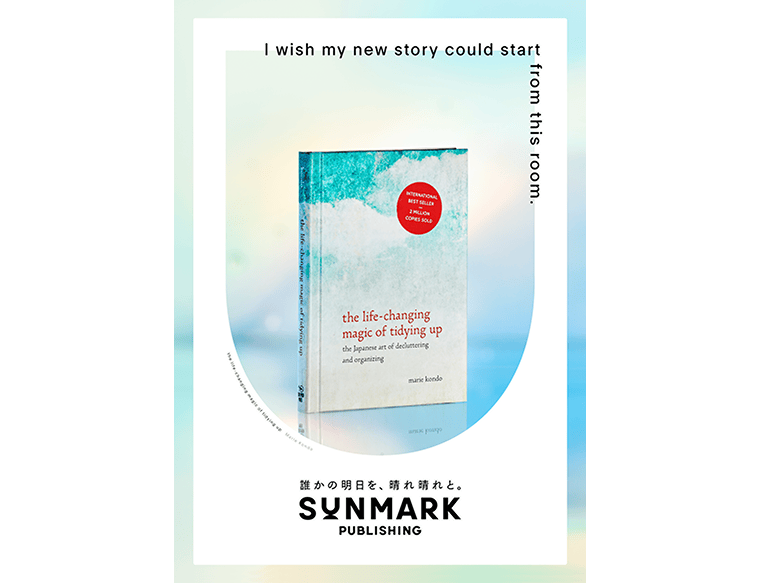About US
Sunmark Publishing was founded in 1971. Our office is in the Shinjuku district of Tokyo, and we have 56 staff. In Keeping with our company's name, our mission is to produce and sell books that create a "sunny tomorrow" for everyone. Our books cover a wide range of genres and provide practical insights for various life experiences. They include literary works, personal development books, business books, practical life books, children’s books, picture books, and books related to spirituality.Eight of our books have each sold over a million copies in Japan. We have taken that success overseas, and exceptionally for a Japanese publisher of mainly non-fiction books , six of our books have also sold more than one million copies each outside Japan.
Books with global series sales of over one million
(sales outside Japan)
- The Life-changing Magic of Tidying Up (15 million)
- Before the Coffee Gets Cold (6.5 million)
- A Compass to Fulfillment (7.5 million)
- Kokoro("Heart") (1.8 million)
- The Hidden Messages in Water (5.5 million)
- The Enzyme Factor (3.7 million)
Of these, two books in particular have caught the attention of readers around the world:
The Life-changing Magic of Tidying Up
by Marie Kondo

Back in 2011, when organizing consultant Marie Kondo published her first book, The Life-changing Magic of Tidying Up, she was completely unknown. But within a year the book had sold over one million copies in Japan. Her many appearances on TV and in other media helped make her a well-known figure, and earned her the nickname “KonMari.” It was the start of brand new tidying up movement.
Since then, the Japanese concept of “tokimeki,” translated into English as “Spark Joy,” has become her international catchphrase. The 2014 English translation of her book quickly gained a regular spot on the New York Times bestseller list and was ranked No.1 overall on Amazon in the US. It has also become a bestseller in Italy, France and other European countries.In 2015, Marie Kondo was named by TIME magazine as one of the “100 Most Influential People” in the world, alongside such distinguished figures as Japanese novelist Haruki Murakami, former President Barack Obama, and Apple CEO Tim Cook. KonMari became even more famous, and the English words “konmari-ing” and “kondo-ing” were coined to describe the act of tidying up Marie Kondo-style.She even shared her tidying-up method in a 2019 Netflix series called Tidying Up with Marie Kondo, which became a huge hit and was nominated for two Emmy Awards. In 2021, it was followed up by Sparking Joy with Marie Kondo.
Before the Coffee Gets Cold by Toshikazu Kawaguchi

The first Japanese edition of Before the Coffee Gets Cold numbered only 7,000 copies, but the novel has since become a million-seller in the US, Italy, and the UK. To date, over five million copies of this massive hit series have been sold worldwide.
This international success began in Taiwan in 2017. Following excellent sales there, Sunmark’s International Rights Department decided to have it translated for the US and European markets and gradually signed more contracts in different countries. Those efforts paid off, and from around 2020, translations were published in Italy, the UK, New Zealand, Canada and other countries, helping make the novel a huge hit around the world.
Notably, in Italy during the Covid-19 pandemic lockdown, readers recommended the book to friends, who then recommended it to other friends, sparking a miraculous word-of-mouth million-seller success.
Author Toshikazu Kawaguchi has responded enthusiastically to requests for promotional tours, lectures, and book signings all over the world, while his personality and engagement with readers has helped make his series an even bigger hit. As of 2014, he has visited 14 countries and his books have been translated into 45 languages.
The series has been a big hit in the US and UK, and now there is talk of a Hollywood adaptation, opening up possibilities for global content industries. This year (2024) we have been making steady progress towards a movie, with promotional tours in New York and Los Angeles, and meetings with producers in Hollywood.
These are just two examples of how we strive to bring the very best books to people around the world. Learn more about our company mission below. At Sunmark, we put our hearts and souls into the books we publish, and our mission is to light up readers’ lives just like the sun.
Mission“Creating a sunny tomorrow for people around the world.”
Is anyone’s life always sunny?Life is a series of events that that make you say “really?” And sometimes, the big crises are easier to deal with. Harder are the nights when you lose the will to live, when you want to run away, when you feel utterly alone, when the only thing you have left is boredom.
Yet, the morning always comes, and the sun always rises. At Sunmark, we believe in the special power of books to bring our readers a better tomorrow. Authors have also lived through many hardships, and that’s why their books are filled with words of hope. As the Japanese saying goes: “Fall down seven times, get up eight.”
Readers share in author’s struggles, finding inspiration in their passion and determination. Authors use all their ingenuity and imagination bring happiness to readers. And we, as a publisher, by publishing the best books we can, seek to create a sunny tomorrow for everyone.
After finishing a book’s final page, the world looks different. There is new hope in your heart, the world looks brighter, and you are ready to take a new step on life’s path. Somehow, you and the world have changed.
That’s the experience we our publishing work to bring to readers around the world. And just as the sun brings light to all, we want our books bring hope to everyone, without hurting or disparaging anyone.
So we work our hardest every day, confident that a better future is waiting.
Our mission is to create a sunny tomorrow for every reader—whatever today they face and wherever in the world they are.
- Sunmark Publishing“Creating a sunny tomorrow for people around the world.”
